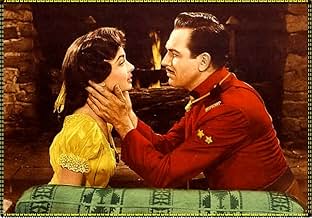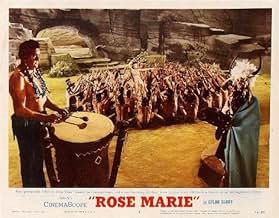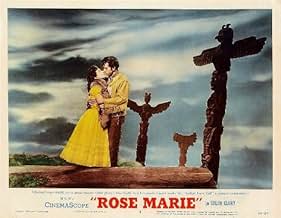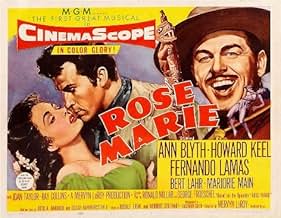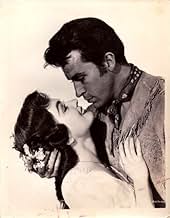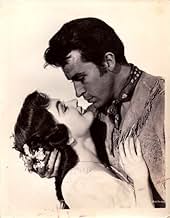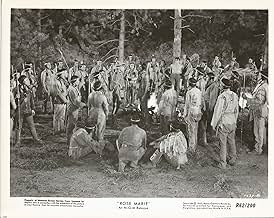अपनी भाषा में प्लॉट जोड़ेंWilderness girl Rose Marie has adventures in life and love when Mountie Mike Malone takes her out of the wild.Wilderness girl Rose Marie has adventures in life and love when Mountie Mike Malone takes her out of the wild.Wilderness girl Rose Marie has adventures in life and love when Mountie Mike Malone takes her out of the wild.
Dorothy Adams
- Townswoman
- (बिना क्रेडिट के)
Fred Aldrich
- Woodsman in Saloon
- (बिना क्रेडिट के)
Robert Anderson
- Corporal
- (बिना क्रेडिट के)
John Angelo
- Man at Charity Dance
- (बिना क्रेडिट के)
Emile Avery
- Mountie
- (बिना क्रेडिट के)
Walter Bacon
- Man at Charity Dance
- (बिना क्रेडिट के)
Al Bain
- Woodsman in Saloon
- (बिना क्रेडिट के)
Margaret Bert
- Townswoman
- (बिना क्रेडिट के)
Chris Willow Bird
- Indian
- (बिना क्रेडिट के)
Oscar Blank
- Woodsman in Saloon
- (बिना क्रेडिट के)
फ़ीचर्ड समीक्षाएं
I well remember seeing this movie when it was shown in New Zealand about 1955. It was an enjoyable movie and my desire to own it on DVD was only heightened when I recently saw it on Turner Classic Movies. Regrefully most TCM movies in New Zealand are a bit blurry and the sound track had lots of 50/60 cycle hum in it. It would be nice if it was to be released on DVD particularly if a little care was taken in restoring the visual print and the sound track.
The original sound track for Rosemarie was a magnetic 3 channel across the screen and 1 surround channel. With modern sound restoration and enhancement equipment that is available today, there is no reason why this could not be restored to quiet a presentable 5.1 sound track.
It disappoints me to see many of the fine old movies reissued with excellent visual print but little care having been taken on the sound restoration when as a sound engineer specializing in old recorded sound restoration I know much better could be done.
The original sound track for Rosemarie was a magnetic 3 channel across the screen and 1 surround channel. With modern sound restoration and enhancement equipment that is available today, there is no reason why this could not be restored to quiet a presentable 5.1 sound track.
It disappoints me to see many of the fine old movies reissued with excellent visual print but little care having been taken on the sound restoration when as a sound engineer specializing in old recorded sound restoration I know much better could be done.
Canadian Mountie Mike Malone (Howard Keel) encounters orphan Rose Marie Lemaitre (Ann Blyth) on her canoe in the wilderness alone. Her father was a French trapper. She would rather live alone in the wild. Malone forces her back to Fort Macroy where she continues to rebel. In time, she joins the Mounties under Malone. She falls for French trapper James Severn Duval (Fernando Lamas).
This musical is reportedly one of Busby Berkeley's last movie work. The exterior shots have the amazing Canadian wilderness vista. The music is more opera in nature which is not my taste. Otherwise, this romance mostly works although it is very old fashion. There is some awkward stuff which is the old fashion stuff.
This musical is reportedly one of Busby Berkeley's last movie work. The exterior shots have the amazing Canadian wilderness vista. The music is more opera in nature which is not my taste. Otherwise, this romance mostly works although it is very old fashion. There is some awkward stuff which is the old fashion stuff.
Saw this on a massive CinemaScope screen during its first-run release at the Egyptian Theater in Hollywood, California. If memory serves (since I haven't caught it on a Turner Classic Movies broadcast recently) it was enjoyable and nicely mounted, although I seem to recall that a lot of it was done on some massive MGM soundstages rather than outdoors in the northern California and Canadian locations. Of course that was usually the case with musicals with outdoor settings. Technical considerations prompted the studios to go the easy route of utilizing the more easily controlled environments of, in MGM's case, their Culver City, Calif. lot and stages subbing for the great outdoors. Howard Keel and Ann Blyth (and Fernando Lamas, too) acquitted themselves quite nicely in the vocal department. And any movie that gives us Marjorie Main and Bert Lahr for some expert comic relief is to be fondly remembered. Although its popularity may not merit it, it would be nice to add a DVD version, not yet available, it appears, of this widescreen/stereo remake to one's video library.
Bears little resemblance to the (better) MacDonald/Eddy version, at least what little I can remember of it. Very much in the style of musical that MGM would do for the better part of the 50's, for better and worse. As such, it was fine. Would have improved had they cut the entire Duval/Wanda subplot and just focused on Howard Keel and Ann Blyth. Busby Berkeley worked on the staging of the musical sequences --his last major theatrical film until 1962's Jumbo-- but there was really only one short sequence which clearly bore his fingerprints: the one involving the Native American medicine man (Thurl Ravenscroft, best known for How the Grinch Stole Christmas) and a group dance centered around Wanda. In retrospect, considering Berkeley's Hollywood career as just about over, this was a fitting bookend to someone whose very first Hollywood job was on the Eddie Cantor musical, Whoopee!, faint echoes of which appeared in that aforementioned sequence. Aside from that sequence, the best part of the film was a comic number by Bert Lahr, doing a more up-tempo variation on his big number from The Wizard of Oz ('If I Were King of the Forest'). For me, this lost steam about two-thirds of the way through and never really recovered. And I didn't like the ending either. Well-produced, but still rather middling.
In this third film of Rose Marie and probably the last one we'll ever see, every single version of the film is different to each other and to the plot of the original Broadway show. Since operettas are a thing of the past I doubt another version would be made. Where would you get voices like Ann Blyth, Howard Keel and Fernando Lamas?
This version has Ann Blyth as Rose Marie, a trapper's daughter now alone out in the woods. Though she's pretty capable of taking care of herself, those in authority don't see it that way. Mountie Howard Keel brings her into what passes for civilization in the Canadian west at the turn of the last century.
Keel's seeing Ann in a whole different light when she puts on a dress, but trapper Fernando Lamas will take her any old way, so Ann's got to choose between them.
The main songs from the 1936 version make it here, you couldn't really do Rose Marie without Indian Love Call, The Mountie Song or the title number. Rudolf Friml wrote some other nice songs for the original Broadway production which didn't make it into the classic Nelson Eddy/ Jeanette MacDonald version or this one.
Friml contributed some new songs in what would turn out to be his next to last songwriting assignment and they're well suited for the voices that have to sing them. Otto Harbach and Oscar Hammerstein, II did the original lyrics for Broadway, but in this Paul Francis Webster collaborated with Friml and provided the words.
For comic relief we have Marjorie Main and Bert Lahr, playing something along the lines of a cowardly Mountie. But actually he proves to be of invaluable help to Howard Keel.
Keel in his memoirs was not originally satisfied with the Mountie part, feeling he was written like a Dudley DooRight idiot in the first draft. Some considerable rewriting was done before he went before the camera.
He also tells of a practical joke that second unit director Howard Koch pulled on director Mervyn LeRoy by having Jack Benny show up in a Mountie uniform and mess up the takes of the Mountie Song. Benny and LeRoy were good friends and when LeRoy realized who it was, he broke up and shooting was done for the day.
Busby Berkeley got some work in this film, staging the Totem Tom Tom number. There are words to the song, but you won't hear any in this or in the earlier one. Totem Tom Tom is nicely choreographed. I'm always amazed at how Rudolf Friml who studied under Anton Dvorak in Prague before coming to America was able to capture the American Indian rhythm with that song.
This 1954 version of Rose Marie has enough merit to it that it does not suffer comparison with what Nelson and Jeanette did back in the day. Fans of operetta will like it, even devoted Eddy/Mac people.
This version has Ann Blyth as Rose Marie, a trapper's daughter now alone out in the woods. Though she's pretty capable of taking care of herself, those in authority don't see it that way. Mountie Howard Keel brings her into what passes for civilization in the Canadian west at the turn of the last century.
Keel's seeing Ann in a whole different light when she puts on a dress, but trapper Fernando Lamas will take her any old way, so Ann's got to choose between them.
The main songs from the 1936 version make it here, you couldn't really do Rose Marie without Indian Love Call, The Mountie Song or the title number. Rudolf Friml wrote some other nice songs for the original Broadway production which didn't make it into the classic Nelson Eddy/ Jeanette MacDonald version or this one.
Friml contributed some new songs in what would turn out to be his next to last songwriting assignment and they're well suited for the voices that have to sing them. Otto Harbach and Oscar Hammerstein, II did the original lyrics for Broadway, but in this Paul Francis Webster collaborated with Friml and provided the words.
For comic relief we have Marjorie Main and Bert Lahr, playing something along the lines of a cowardly Mountie. But actually he proves to be of invaluable help to Howard Keel.
Keel in his memoirs was not originally satisfied with the Mountie part, feeling he was written like a Dudley DooRight idiot in the first draft. Some considerable rewriting was done before he went before the camera.
He also tells of a practical joke that second unit director Howard Koch pulled on director Mervyn LeRoy by having Jack Benny show up in a Mountie uniform and mess up the takes of the Mountie Song. Benny and LeRoy were good friends and when LeRoy realized who it was, he broke up and shooting was done for the day.
Busby Berkeley got some work in this film, staging the Totem Tom Tom number. There are words to the song, but you won't hear any in this or in the earlier one. Totem Tom Tom is nicely choreographed. I'm always amazed at how Rudolf Friml who studied under Anton Dvorak in Prague before coming to America was able to capture the American Indian rhythm with that song.
This 1954 version of Rose Marie has enough merit to it that it does not suffer comparison with what Nelson and Jeanette did back in the day. Fans of operetta will like it, even devoted Eddy/Mac people.
क्या आपको पता है
- ट्रिवियाJoan Crawford, who played Ann Blyth's mother in Mildred Pierce (1945), played the title role in the original 1928 version of this film, which is now considered lost.
- गूफ़Contrary to what is written on the DVD jewel-box, the "Totem Tom-Tom" number doesn't appear in this version of the operetta. It was replaced by the Totem Dance that is seen in the film.
- कनेक्शनFeatured in MGM/UA Home Video Laserdisc Sampler (1990)
- साउंडट्रैकRose Marie
Music by Rudolf Friml
Original Lyrics by Otto A. Harbach and Oscar Hammerstein II
Revised Lyrics by Paul Francis Webster
Performed by Howard Keel; reprised by Bill Lee and the Mounties
टॉप पसंद
रेटिंग देने के लिए साइन-इन करें और वैयक्तिकृत सुझावों के लिए वॉचलिस्ट करें
- How long is Rose Marie?Alexa द्वारा संचालित
विवरण
- चलने की अवधि
- 1 घं 44 मि(104 min)
इस पेज में योगदान दें
किसी बदलाव का सुझाव दें या अनुपलब्ध कॉन्टेंट जोड़ें


